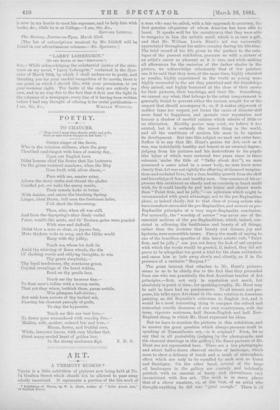POETRY.
TO C HAU C ER.
L'' Than love I most thins flouriis whit() and rods, Such as man canon daysyos in her toun."1 • SWEET singer of the dawn, Who iu the voiceless stillness, when the gray Throbbed opal-tinged with hues of coming day, Upon our English lawn Didst honour chief the flower that lies bestrewn On the green-vestured meadows, when the May Goes forth with silver shoon,— Pace with me, master mine, Adown the dewy crofts and thread the glades Unrifled yet, ere wake the merry maids, Their comely locks to twine With daisies, and salute the blushing Spring. Linger, blest Dawn ; full soon the freshness fades, Full short the blossoming.
Thou, who, when all was still, And from the dayspring's altar dimly curled Faint, wraith-like mists, and th' Eastern gates were pearled With rose and daffodil, Didst blow a note so clear, so joyous free, Mute thickets woke to song, and the blithe world Rang with thy jollity, Teach me, whose lot doth lie Amid the whirring of fierce wheels, the din Of clashing words and eddying thoughts, to win
Thy grave simplicity,—
Thy loyal tenderness, thy courteous grace, Crystal revealings of the heart within, Read on thy gentle face.
Teach me thy humour fine,—
To flout men's follies with a loving smile, That yet they wince, bethink them, pause awhile, Win glimpses half-divine ; But with keen arrows of thy barbed wit, Piercing his close-set panoply of guile, To slay the hypocrite.
Teach me this one best lore,— To dower pure womanhood with worship due,— Maiden, wife, mother, ordered fair and true,—
Bloom, flower, and fruitful core, White, innocent leaves, with rosy blushes tipt, Great many-seeded heart of golden hue, In the strong sunbeams dipt. E. D. S.


































 Previous page
Previous page